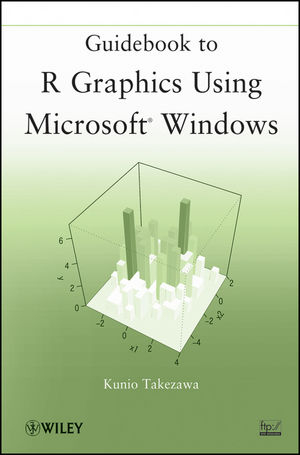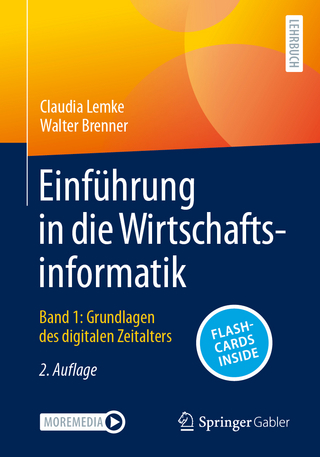
Guidebook to R Graphics Using Microsoft Windows
John Wiley & Sons Inc (Verlag)
978-1-118-02639-7 (ISBN)
- Titel ist leider vergriffen;
keine Neuauflage - Artikel merken
Introduces the graphical capabilities of R to readers new to the software
Due to its flexibility and availability, R has become the computing software of choice for statistical computing and generating graphics across various fields of research. Guidebook to R Graphics Using Microsoft® Windows offers a unique presentation of R, guiding new users through its many benefits, including the creation of high-quality graphics.
Beginning with getting the program up and running, this book takes readers step by step through the process of creating histograms, boxplots, strip charts, time series graphs, steam-and-leaf displays, scatterplot matrices, and map graphs. In addition, the book presents:
Tips for establishing, saving, and printing graphs along with essential base-package plotting functions
Interactive R programs for carrying out common tasks such as inputting values, moving data on a natural spline, adjusting three-dimensional graphs, and understanding simple and local linear regression
Various external packages for R that help to create more complex graphics like rimage, gplots, ggplot2, tripack, rworldmap, and plotrix packages
Throughout the book, concise explanations of key concepts of R graphics assist readers in carrying out the presented procedures, and any coverage of functions is clearly written out and displayed in the text as demos. The discussed techniques are accompanied by a wealth of screenshots and graphics with related R code available on the book's FTP site, and numerous exercises allow readers to test their understanding of the presented material.
Guidebook to R Graphics Using Microsoft® Windows is a valuable resource for researchers in the fields of statistics, public health, business, and the life and social sciences who use or would like to learn how to use R to create visual representations of data. The book can also be used as a supplement for courses on statistical analysis at the upper-undergraduate level.
KUNIO TAKEZAWA, PhD, is Research Scientist in the Department of Information Science and Technology at the National Agricultural Research Center (Japan) and Associate Professor in the Cooperative Graduate School System at the University of Tsukuba (Japan). He has published numerous journal articles in his areas of research interest, which include nonparametric regression, smoothing methods, and fuzzy estimation. Dr. Takezawa is the author of Introduction to Nonparametric Regression, also published by Wiley.
Preface ix Acknowledgments xiii
1. Basic graphics 1
1.1 Introduction 1
1.2 Downloading and installation of R 1
1.3 Start-up of R, and construction and execution of r programs 3
1.4 Coordinate axes 11
1.5 Points and straight lines 15
1.6 Reuse of graphs produced by R 16
1.7 Text 24
1.8 Various points and straight lines 27
1.9 Fonts 34
1.10 Figures such as circles and rectangles 36
1.11 Legends and Logarithmic plots 41
1.12 Bar charts 42
1.13 Pie charts 45
1.14 Layout of multiple graphs 46
1.15 Summary 60
Exercises 62
2. Graphics for statistical analysis 65
2.1 Introduction 65
2.2 Stem-and-leaf displays 66
2.3 Histograms and probability density functions 67
2.4 Strip chart 73
2.5 Boxplots 75
2.6 Multiple-axis layouts 80
2.7 Display of confidence intervals 91
2.8 Scatter plot matrices 93
2.9 Radar charts and parallel charts 95
2.10 Functions of one variable 97
2.11 Functions of two variables 100
2.12 Map graphs 108
2.13 Histograms of two variables 113
2.14 Time series graphs of two variables 116
2.15 Implicit functions 119
2.16 Probability density functions 121
2.17 Differential values and values of integrals 124
2.18 Summary 132
Exercises 133
3. Interactive R programs 139
3.1 Introduction 139
3.2 Positioning by mouse on a graphics window 140
3.3 Inputting values on the console window to draw a graph 143
3.4 Reading data from a data file 156
3.5 Moving data on a natural spline 158
3.6 Understanding simple regression 166
3.7 Adjusting three-dimensional graphs 175
3.8 Constructing polynomial regression equations interactively 180
3.9 Understanding local linear regression 183
3.10 Summary 188
Exercises 190
4. Graphics obtained using packages based on R 193
4.1 Introduction 193
4.2 Package “rimage” 194
4.3 Package “gplots” 195
4.4 Package “ggplot2” 200
4.5 Package “scatterplot3d” 203
4.6 Package “rgl” 207
4.7 Package “misc3d” 221
4.8 Package “aplpack” 232
4.9 Package “vegan” 234
4.10 Package “tripack” 236
4.11 Package “ade4” 238
4.12 Package “vioplot” 241
4.13 Package “plotrix” 243
4.14 Package “rworldmap” 247
Exercises 249
5. Appendix 253
A.1 Digital files 253
A.2 Free software 254
A.3 Data 254
| Zusatzinfo | Screen captures: 50 B&W, 0 Color; Graphs: 50 B&W, 0 Color |
|---|---|
| Verlagsort | New York |
| Sprache | englisch |
| Maße | 156 x 234 mm |
| Gewicht | 395 g |
| Themenwelt | Informatik ► Office Programme ► Outlook |
| Mathematik / Informatik ► Mathematik ► Computerprogramme / Computeralgebra | |
| Mathematik / Informatik ► Mathematik ► Wahrscheinlichkeit / Kombinatorik | |
| ISBN-10 | 1-118-02639-X / 111802639X |
| ISBN-13 | 978-1-118-02639-7 / 9781118026397 |
| Zustand | Neuware |
| Informationen gemäß Produktsicherheitsverordnung (GPSR) | |
| Haben Sie eine Frage zum Produkt? |
aus dem Bereich


